-
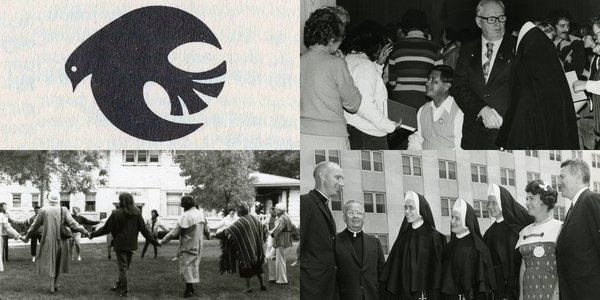
Peace Studies Dove, no date; Cesar Chavez at Mundelein College, 1979; Share Week in front of Piper Hall at Mundelein College, 1998; CANA Conference, 1963
-
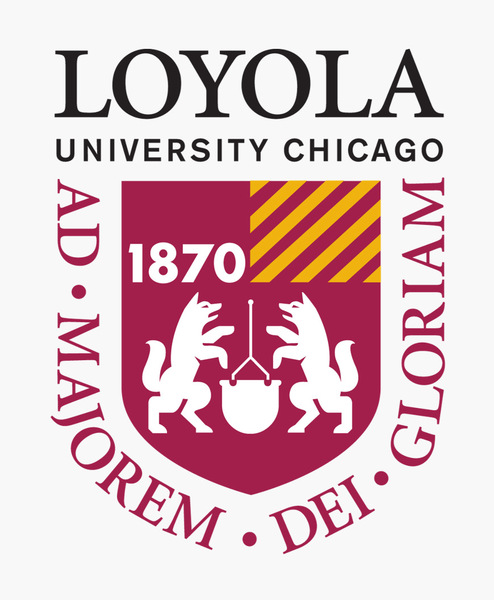
Loyola Logo New
-

Mundelein College Logo New
-
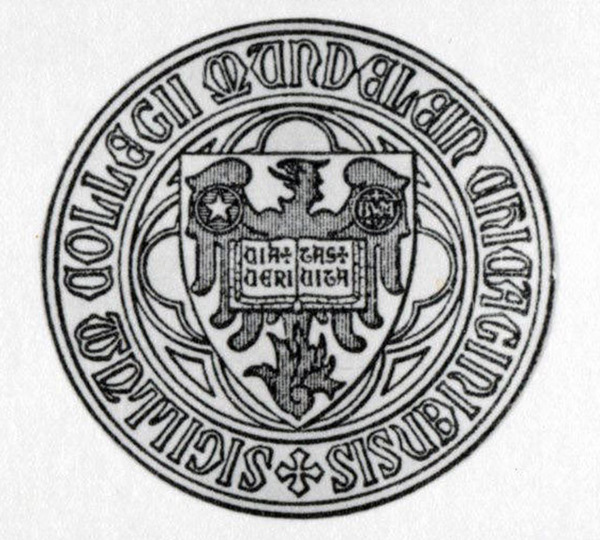
Mundelein College Logo
-
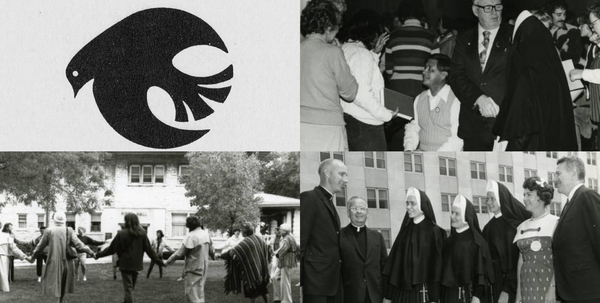
Peace Studies Dove, no date; Cesar Chavez at Mundelein College, 1979; Share Week in front of Piper Hall at Mundelein College, 1998; CANA Conference, 1963
-
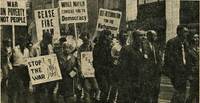
March urging end to war in Vietnam
-
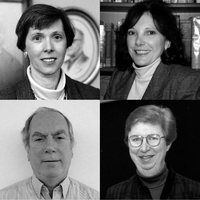
Professor Kathleen McCourt, Circa Early 1990s; Professor Gilda Parrella, 1993; Professor William French, 2018; Professor Prudence Moylan, 1998
-
Thanks to:
Laura Berfield
Janette Clay
Nathan Ellstrand
Kathleen Ermitage
Nancy Freeman
William French
Kathleen Maas-Weigert
Kathleen McCourt
Prudence Moylan
Gilda Parrella
Steffen Scharmacher
Bibliography
Jegen, Carol Frances, B.V.M. “Working with the People: The Religious Studies Department, 1957-1971.” In Mundelein Voices: The Women’s College Experience, edited by Anne M. Harrington and Prudence Moylan, 106-122. Chicago: Loyola Press, 2001.
Moylan, Prudence. “A Catholic Women’s College Absorbed by a University: The Case of Mundelein College.” In Challenged by Coeducation: Women’s Colleges Since the 1960s, edited by Leslie Miller-Bernal and Susan L. Poulson. Nashville: Vanderbilt University Press, 2007.
Sullivan, Mary Ann. B.V.M. “A Tale of Two Mundeleins, 1947-1951.” In Mundelein Voices: The Women’s College Experience, edited by Anne M. Harrington and Prudence Moylan, 92-105. Chicago: Loyola Press, 2001.
-
Contact Information:
Phone: 773.508.8837
WLArchives@luc.edu
Mailing Address:
Women & Leadership Archives
Loyola University Chicago
Piper Hall, Third Floor
1032 W. Sheridan Rd.
Chicago, IL 60626
Street Address:
Women & Leadership Archives
Loyola University Chicago
Piper Hall, Third Floor
970 W. Sheridan Rd.
Chicago, IL 60626
-
Addams, Jane, PM, Part 2, 50-55
Apartheid, PM, Part 2, 55-60
Breslin, Mary, PM Part 2, 20-25
BVM Constitution, PM, Part 1, 10-15
BVM, PM, Part 2, 5-10
Cardinal Bernardin, PM, Part 2, 25-30
Catholic Christian Justice, PM, Part 2, 40-45
Catholic Justice Tradition, PM, Part 2, 1.05-1.10
Center for Women and Peace, PM, Part 2, 30-35, 50-55
Cesar Chavez, PM, Part 2, 25-30
Economic Opportunity Commission, PM, Part 2, 0-5
Encyclical Pachem in Terris, PM, Part 1, 0-5
Eucharist, PM, Part 1, 15-20
Farrell, Carolyn PM, Part 2, 35-40
Feminism, PM, Part 2, 1.15-1.20
French, William, PM, Part 2, 40-45, 1.00-1.05
Galtung, John PM, Part 2, 40-45
Gannon Center for Women and Leadership, PM, Part 2, 35-40
Gannon, Anne, Ida, PM, Part 1, 5-10, 10-15
Gaudem et Spes, PM, Part 1, 10-15
Gender Research Center, PM, Part 2, 1.10-1.15
Gender Studies, PM, Part 2, 1.10-1.15, 1.15-1.20
Havana, Cuba Peace Meeting 1987 PM, Part 2, 15-20
Hispanic Ministry, PM, Part 2, 10-15
History of the Mundelein Peace Studies Program, PM, Part 1, 0-5, 5-10, 10-15, 15-20, 20-25
Ignatian Pedagogy, PM, Part 2, 50-55, 1.15-1.20
Inglestam, Margarita, PM, Part 2, 25-30
Jegen, Sister Carol Frances, PM, Part 1, 0-5, 10-15, 15-20, Part 2, 5-10, 10-15, 1.00-1.05, 1.05-1.10
Jegen, Sister Mary Evelyn, PM, Part 2, 5-10, 10-15, 30-35
Jesuit Mission, PM, Part 2, 1.05-1.10
Jesuits, PM, Part 1, 20-25, Part 2, 35-40
Loyola Mundelein Affiliation, PM, Part 1, 0-5
Loyola Peace Studies Minor, PM, Part 2, 35-40, 1.05-1.10
MacArthur Foundation, PM, Part 2, 20-25
McCourt, Kathleen , PM, Part 2, 35-40, 40-45
Moylan, Prudence, PM, Part 1, 0-5
Mundelein Home Economics Program, PM, Part 2, 35-40
Mundelein Nursing Program, PM, Part 2, 35-40
Mundelein Nutrition Program, PM, Part 2, 35-40
Mundelein Tradition, PM, Part 2, 30-35
Mundelein Women’s Studies Program, PM, Part 2, 15-20
Negative Peace and Positive Peace, PM, Part 2, 45-50
Nobel Peace Prize, PM, Part 2, 50-55
Notre Dame de Namur, PM, Part 2, 5-10
Pax Christi, PM, Part 2, 5-10, 10-15, 10-15, 15-20, 30-35
Peace Studies Internship, PM, Part 2, 30-35
Piper Hall, PM, Part 2, 35-40
Pope John XXII, PM, Part 1, 0-5
Professional transfer from Mundelein to Loyola, PM, Part 2, 35-40
Reuter, Larry, PM, Part 2, 35-40
Roosevelt, Eleanor, PM, Part 1, 0-5
Sanctions, PM, Part 2, 1.00-1.05
Second Vatican Council, PM, Part 1, 0-5, Part 2, 0-5
Sexual harassment, PM, Part 2, 1.10-1.15
Sexual Violence, PM, Part 2, 1.10-1.15
Sisters of Charity of the Blessed Virgin Mary or BVM, PM, Part 1, 5-10, PM, Part 2, 30-35, 35-40, 1.15-1.20
Spertus College, PM, Part 2, 45-50
The Women and Leadership Conference, PM, Part 2, 1.05-1.10
Title IX, PM, Part 2, 1.10-1.15
United Farm Workers’ Strike, 1973, PM Part 2, 0-5, 10-15
Uppsala Sweden, PM, Part 2, 30-35
Vatican Peace and Justice Commission, PM, Part 2, 10-15
Whalen, Mary Margaret, PM, Part 1, 5-10
Women Studies and Peace Studies Connection, PM, Part 2, 1.10-1.15, 1.15-1.20
Women’s Peace Camps, PM,,Part 2, 25-30
World Council of Churches, PM, Part 2, 10-15, 15-20
-
1983 Catholic Bishops’ Pastoral Letter, WF, Part 1, 5-10
2007 Peacemaking in an Age of Terror Conference, WF, Part 2, 0-5
Arun Gandhi, WF, Part 2, 0-5
Berrigan, Daniel, WF, Part 2, 0-5
Boston Globe, WF, Part 2, 0-5
Caldicott, Dr. Helen, WF, Part 2, 0-5
Carroll, James, WF, Part 2, 0-5
Carson, Tom, WF, Part 1, 5-10
Center for Ethics and Institute for Pastoral Studies, WF, Part 2, 0-5
Chicago Center for Peace Studies, WF, Part 2, 0-5
Daricki, Eugene, WF, Part 2, 0-5
DePaul University, WF, Part 2, 0-5
Father Garanzini, WF, Part 2, 0-5
Gandhi, WF, Part 1, 10-15
Horn of Africa, WF, Part 2, 0-5
Jegen, Sister Carol Frances, WF, Part 1, 5-10, 15-20
Kroc Center for International Peace at Notre Dame, WF, Part 1, 0-5
Ludwig, Bob, WF, Part 2, 0-5
McCourt, Kathleen, WF, Part 1, 0-5
Messbarger, Paul, WF, Part 1, 5-10
Moylan,Prudence, WF, Part 1, 5-10
North Africa, WF, Part 2, 0-5
Pax Christi, WF, Part 1, 10-15
Peace Studies Association, WF, Part 1, 10-15
Physicians for Social Responsibility, WF, Part 2, 0-5
Political Science Department, WF, Part 1, 5-10
ROTC Program, WF, Part 1, 5-10
Schraeder, Peter, WF, Part 1, 5-10, Part 2, 0-5
Sparks, Mary, WF, Part 1, 5-10
Walzer, Michael, WF, Part 1, 15-20
Women’s Studies, WF, Part 1, 15-20
-
Carter, Jimmy, GP, Part 2, 25-30
Conflict Resolution Catalysts, GP, Part 1, 0-4:32, Part 2, 40-45
French, William, GP, Part 2, 10-15, 20-25, 45-50
Iran hostage crisis, GP, Part 2, 25-30
Jegen, Carol Frances, GP, Part 2, 20-25, 45-50, 50-53:38
Lakeshore Campus, GP, Part 2, 5-10, 10-15, 50-53:38
Loyola Mundelein affiliation, GP, Part 2, 0-5
Loyola University Chicago, GP, Part 1, 0-4:32, Part 2, 0-5, 5-10, 10-15, 30-35, 50-53:38
McCourt, Kathleen, GP, Part 1, 0-4:32, Part 2, 0-5, 50-53:38
Moylan, Prudence, GP, Part 2, 10-15, 20-25, 45-50
Mundelein College, GP, Part 1, 0-5, Part 2, 0-5, 10-15, 20-25, 50-53:38
Pearce, Barnett, GP, Part 1, 0-4:32, Part 2, 0-5
Peace Studies, GP, Part 1, 0-4:32, Part 2, 0-5, 5-10, 10-15, 15-20, 30-35, 45-50, 50-53:38
Social justice, GP, Part 2, 45-50
Soviet Union, GP, Part 1, 0-4:32, Part 2, 15-20, 40-45
Water Tower Campus, GP, Part 2, 5-10, 10-15
Women’s Studies, GP, Part 2, 10-15, 25-30
-
Academic Council, KM 20-25
Chicano Rights Movement, KM, 25-30
El Salvador, KM, 10-15, 15-20
Faculty Council, KM, 5-10, 20-25
French, William, KM, 10-15
Gulf War, KM 25-30
Jegen, Sister Carol Frances, KM, 10-15
Jesuit, KM, 10-15, 15-20, 20-25, 30-34:09
Loyola Mundelein affiliation, KM, 0-5, 20-25
Loyola University Chicago, KM, 0-5, 5-10, 10-15, 15-20, 20-25, 25-30, 30-34:09
Messbarger, Paul, KM, 10-15
Moylan, Prudence, KM, 10-15
Mundelein College, KM 0-5, 5-10, 10-15, 15-20, 20-25, 30-34:09
Nyden, Phil, KM, 10-15
Ozar, David, KM, 10-15
Peace Studies, KM, 0-5, 5-10, 10-15, 15-20, 20-25, 25-30, 30-34:09
Schraeder, Peter, KM, 10-15
Schweickart, David, KM, 10-15
Sisters of Charity of the Blessed Virgin Mary, KM, 10-15
Social justice, KM, 30-34:09
South African Divestment, KM, 1-5, 25-30
Wittner, Judy, KM, 10-15
Vietnam War activism, KM, 25-30
-
Professor Emerita of History Loyola University of Chicago
Dr. Prudence Moylan is a Professor Emerita of history at Loyola University of Chicago. At the time of the Mundelein and Loyola affiliation, Dr. Moylan was a professor of history and member of the Peace Studies faculty at Mundelein. Dr. Moylan contextualizes the Peace Studies Program and discusses its historical origins in Vatican II and nineteen-sixties peace and justice activist campaigns as well as its connections to women’s peace activism. According to Dr. Moylan, there were some significant obstacles to overcome during the meetings of the Peace Studies committee. Three significant barriers were the lack of focus on women and peace, titles for the program, and related definitions of the concept, “peace.” Though the committee did not have any settled focus on women, they settled on the simple name, “Peace Studies” and incorporated a complex, inclusive, and multidisciplinary approach to peace.
-
Associate Professor of Theology and Director of Peace Studies Loyola University of Chicago
Bill French discusses in the interview both the affiliation of the two schools and his participation in the Peace Studies committee to create the program at Loyola. In commenting on the affiliation in the early 1990s, he mentions that it was a time of sadness and loss for those connected to Mundelein College. French then goes on to explain what led to the creation of Peace Studies. The Bishops Pastoral Letter called for courses focused on war and peace issues, as well as to engage with the pacifist heritage, engage just war tradition and engage sadness of aggression of holy war. Mundelein College was also the seventh institution in founding the national Peace Studies Association. Dean Kathleen McCourt asked French to serve on the Peace Studies committee, where the members identified a list of courses. There existed an ideological split on what the program should be - whether Peace and Conflict Studies or Peace Studies. In the end, the committee came to a compromise, keeping elements of both.
-
Professor Emerita School of Communication Loyola University of Chicago
In the interview, Parrella describes her involvement with the Peace Studies committee in the early 1990s in order to create a new program at Loyola University Chicago following affiliation with Mundelein College. Parrella has a research background in conflict resolution and participated in a group called Conflict Resolution Catalysts in the Soviet Union in 1990. Within the committee, she discusses the gender dynamic of the committee with the women more interested in material regarding mediation and resolving conflict, whereas the men were focused on coursework on power and authority. She also notes how men dominated the conversations. Of importance to her in forming the program was not simply to have a collection of classes under a header, but to have courses that worked towards making the world better. The university incorporated the minor into the curriculum in 1993. Parrella closes reflecting on reflecting on the importance of peace to her in relation to her work on conflict resolution in war and peace settings, stressing interpersonal relations and mediation.
-
Former Dean of the College of Liberal Arts and Sciences
Loyola Emeritus Professor of Sociology, Dr. Kathleen McCourt was the dean of Loyola’s College of Liberal Arts and Sciences from 1989 through 1998, and in that position she oversaw the transition of the Peace Studies Program during Loyola and Mundelein’s affiliation in 1991. Loyola had a faculty group called “Faculty and Staff Initiatives for Peace and Justice” who were interested in developing a Peace Studies program and Mundelein had one with faculty in place. Dr. McCourt introduced both groups to one another and facilitated their conversations about how to approach Peace Studies. After initial meetings of the two groups, Dean McCourt headed the resulting Peace Studies Committee and gathered faculty from both Loyola and Mundelein to develop the interdisciplinary program for Peace Studies at Loyola.
-
The Women and Leadership Archives Peace Studies Oral Histories Project began at the behest of professor, Kathleen Maas Weigert. As the Carolyn Farrell, BVM, Professorship for Women and Leadership endowed professor and as a leading scholar of peace, Professor Weigert recognized the importance of the story of Peace Studies at Mundelein College and its transition during the affiliation of Mundelein College and Loyola University Chicago. Professor Weigert and Nancy Freeman, director of the Women and Leadership Archives, Loyola University Chicago asked award winning videographer Kathleen Ermitage to facilitate the documentation of that story. In 2015, Ms. Ermitage conducted oral interviews with Professors William French, Kathleen McCourt, Gilda Parrella, and Prudence Moylan.
-
The Peace Studies minor at Loyola University Chicago originated at Mundelein College. The college was founded in 1930 in Chicago, Illinois by the Sisters of Charity of the Blessed Virgin Mary (BVM), and was steeped in their commitment to peace and justice. For sixty years, Mundelein offered a comprehensive Catholic liberal arts education in the setting of a women’s college before affiliating with Loyola in 1991.
Mundelein College had a long history of peace-related work. For example, Emilie Barron represented Mundelein in 1934 at a national meeting of the Catholic Association for International Peace at Catholic University (Jegen, 117). During the 1940s, the student newspaper - The Skyscraper - espoused two tracks of thought at Mundelein College: education for Catholic life and education for work in the world. The latter emphasized the notion that there was an obligation to make a difference in the world (Sullivan, “A Tale of Two Mundeleins,” 102-103). Members of the Mundelein community participated as individuals for social justice and peace advocacy during the civil rights movement. In 1965, representatives of the college including twenty-eight students and eight faculty joined one of the voting rights marches from Selma to Montgomery, Alabama (Moylan, “A Catholic Women’s College Absorbed by a University,” 87). The work of the Hispanic Institute was also part of this broader work. It was founded in the early 1970s as an evening seminar and went on to become a multitiered program. The program was very supportive of the United Farmworkers and in 1974, many of their activist workers lived in the “Yellow House” on Mundelein’s campus. Cesar Chavez of the United Farm Workers was invited to Mundelein College for its anniversary in 1979 to give the Homily for a shared Eucharist. He commented on the personal solace he received through Mundelein’s support and how it gave him strength to carry on with his mission. (Jegen, 115)
A women-focused approach was integral to the foundation of Peace Studies. In 1971, the Mundelein faculty senate inaugurated the Women’s Studies Committee, supporting the creation of interdisciplinary classes with an emphasis on women. By 1983, the college approved the Women’s Studies minor proposed by the committee. (Moylan, “A Catholic Women’s College Absorbed by a University,” 86-87).
Peace Studies integrated feminist perspectives and became part of Mundelein’s curriculum as a minor in 1989, with 18 students in the inaugural cohort (Jegen, 118). The minor represented the culmination of effort and deep commitment at Mundelein and beyond. It built off of the gradual expansion of Peace Studies programs throughout the country, starting at Manchester College in 1948 and taking off following the Vietnam War in the 1960s. In 1983, the United States Conference of Catholic Bishops penned a letter titled “The Challenge of Peace.” Carol Frances Jegen, BVM, and her sister Mary Evelyn Jegen, SND (School Sister of Notre Dame) in 1984 attended the anniversary retreat of Pax Christi International in Mombar, France. Mundelein was one of the original groups of colleges and universities to inaugurate the national Peace Studies Association in 1987 (Jegen, 117-118).
The importance of women in the peace-making process formed a critical component of the program at Mundelein College, which emphasized the need to develop women leaders in the field of peace-making internationally. In the early stages of the Peace Studies Program, the John D. and Catherine T. MacArthur Foundation supported the creation of a Center for Women and Peace in 1990 (Moylan, “A Catholic Women’s College Absorbed by a University,” 87). The short-lived center served as an institution for local community and international outreach by inviting communities and visiting scholars to share perspectives. The founders also envisioned that the center would provide faculty and student development grants to deepen educational and international experiences.
Upon Mundelein’s affiliation with Loyola in 1991, Kathleen McCourt, then Dean of Loyola’s College of Arts and Sciences, appointed a committee to guide the transition of the Peace Studies minor. The committee, co-chaired by Loyola’s Professor William French and Mundelein’s Carol Frances Jegen, BVM, held discussions that led to a critical discovery of what form the program at Loyola might take and the thinking behind the Peace Studies methodologies. Loyola’s program would include the nonviolent tradition of Gandhi and Martin Luther King Jr., which Mundelein taught, yet would add courses regarding conflict and war. The curriculum design for Loyola also continued the tradition of Mundelein’s multidisciplinary approach.
During the 1992-1993 academic year, the committee continued to sponsor events to develop the program proposal. In November 1993 the Academic Council passed, almost unanimously, the proposal for a Peace Studies minor and classes began shortly thereafter.
The current Loyola Peace Studies minor is organized around a broad definition of peace, encompassing societal peace (including work to reduce violence and inequalities within the United States); international peace (focusing on ending wars, terrorist acts, unequal distribution of resources, and other infringements on human rights and dignity worldwide); and environmental peace (involving work on sustainable resources, global warming, and response to natural and human-made disaster). Consisting of six courses (18 credit hours) including the Peace Studies Overview, the minor provides content regarding the international, societal, and ecological spheres of violence and peace. The program also focuses on methods of analysis and strategies of reconciliation and peace-making.
Completing a minor in Peace Studies facilitates active and informed participation in working for peace. Students may enroll in practica and internship classes, participate in peace-related research projects, write a senior thesis on peace, or become involved with various peace activities at Loyola.
-
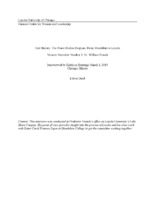
Transcript of Audio Interview with Professor William French
-
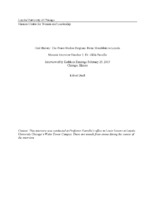
Transcript of Audio Interview with Professor Gilda Parrella
-

Transcript of Audio Interview with Professor Prudence Moylan
-
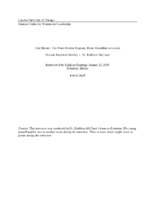
Transcript of Audio Interview with Professor Kathleen McCourt
-

Audio Interview with Professor Prudence Moylan part 2 of 2
-

Audio Interview with Professor Prudence Moylan part 1 of 2












